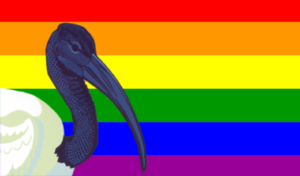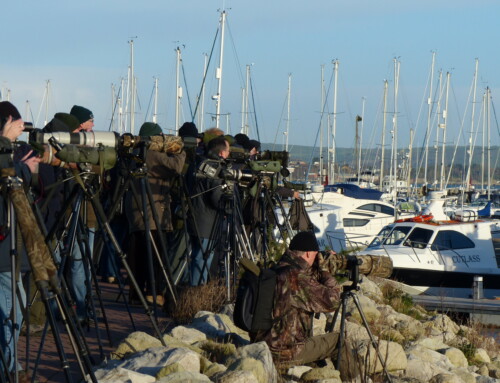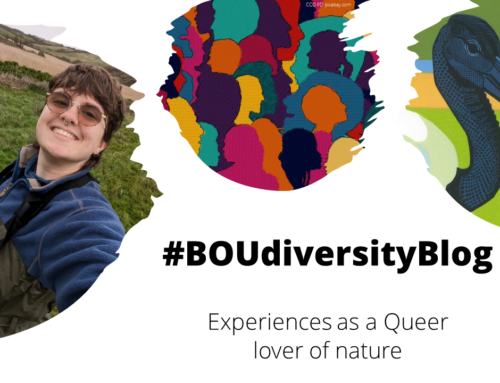 It is 4am – with thermos in hand I close the front door with a click, hop into the car, and after a short drive arrive at my destination – a water treatment facility where my local bird ringing group meets every fortnight to conduct its Constant Effort Site survey. I’m nervous. I hate meeting new people, not because I am antisocial (far from it), but because of the eventual need to “come out” and the uncertainty as to whether this news will be well received. You see, my perception of the birding community at that time was that it consisted predominantly of middle-aged men who, based on my previous interactions with this demographic, were hardly accepting of me as a young gay man.
It is 4am – with thermos in hand I close the front door with a click, hop into the car, and after a short drive arrive at my destination – a water treatment facility where my local bird ringing group meets every fortnight to conduct its Constant Effort Site survey. I’m nervous. I hate meeting new people, not because I am antisocial (far from it), but because of the eventual need to “come out” and the uncertainty as to whether this news will be well received. You see, my perception of the birding community at that time was that it consisted predominantly of middle-aged men who, based on my previous interactions with this demographic, were hardly accepting of me as a young gay man.
Of course, I had need not worry. My local ringing group was incredibly welcoming and in no time, I felt part of the team, assisting with net rounds, and once I became adept at handling birds, helping process and ring our catch. But, my previous perception of the birding community does highlight a potential barrier to LGBTQIA+ folk. Sadly, many within the LGBT community experience prejudice and discrimination because of their sexual orientation or gender identity and as such it is not surprising that many of us avoid social situations we deem threatening, whether that threat be real or perceived.
It is for this reason that the BOU Rainbow Blog series exists – to highlight and celebrate the diversity within the BOU and the wider ornithological community, to expel previous misperceptions of our community, and to create a platform where LGBT ornithologists can share their stories. So, on that note I guess I should share more of mine.
Despite growing up in rural Suffolk with RSPB Minsmere on my doorstep I was pretty late to the ornithological world. As a kid I was instead fascinated by primates, and having read Jane Goodall’s In the Shadow of Man was determined to follow in her footsteps and study chimpanzees in central Africa. Alas, chimpanzees and most other non-human primates for that matter, reside in countries where as a gay man I could be persecuted or even imprisoned for simply being myself – this was not a risk I was willing to take, hence the dream of becoming a primatologist remained just that.
So, if not primatology, what should I do? Through bird ringing, which I began mostly out of curiosity after stumbling upon the BTO’s website, I found the solution to this dilemma. Instead, I could pursue a new found passion for birds and avoid fieldwork in gay-illegal countries. This is precisely what I have done – having recently completed a DPhil on island colonising birds during which I was lucky enough to make use of my ringing skills as I island-hopped around French Polynesia to collect genetic samples and morphometric data from the region’s introduced avifauna.
Growing up in conservative Suffolk where homophobia was common and openly gay role models absent, imprinted in me numerous insecurities that I continue to struggle with today. For example, I have a habit of over thinking things, I am an anxious person and I am quick to doubt myself. These insecurities have made my work (as an aspiring academic) incredibly difficult at times. As a young gay kid, I would avoid drawing attention to myself but as a scientist I find myself in the conflicting situation of having to do just that in order to establish a career.
Navigating this conflict has been tough, but the countless hours I have spent, often on crisp winter mornings, with birds in hand has been an incredibly healing pastime. I hope others in the LBGT community can also find such solace through birding and ornithology.
If you are interested in contributing to our Rainbow Blog series, then please get in touch with us via this form which ensures anonymity for those who seek it.
You can read other articles from our Rainbow Blog series here
If you’re an LGBT ornithologist working in the field and want support, then contact LGBTQ+ Field Network.
If you want to learn more about LGBTQIA+, then Stonewall is a great place to start.




